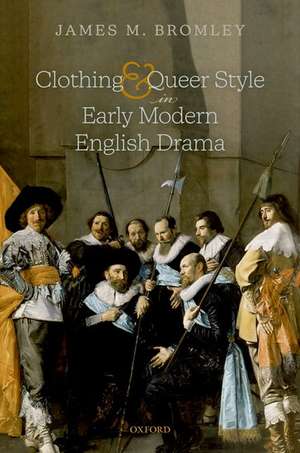Clothing and Queer Style in Early Modern English Drama
Autor James M. Bromleyen Limba Engleză Hardback – 27 mai 2021
Preț: 473.94 lei
Preț vechi: 561.74 lei
-16% Nou
Puncte Express: 711
Preț estimativ în valută:
90.70€ • 94.34$ • 74.88£
90.70€ • 94.34$ • 74.88£
Carte disponibilă
Livrare economică 13-19 martie
Preluare comenzi: 021 569.72.76
Specificații
ISBN-13: 9780198867821
ISBN-10: 0198867824
Pagini: 240
Ilustrații: 17 Illustrations
Dimensiuni: 165 x 241 x 19 mm
Greutate: 0.51 kg
Editura: OUP OXFORD
Colecția OUP Oxford
Locul publicării:Oxford, United Kingdom
ISBN-10: 0198867824
Pagini: 240
Ilustrații: 17 Illustrations
Dimensiuni: 165 x 241 x 19 mm
Greutate: 0.51 kg
Editura: OUP OXFORD
Colecția OUP Oxford
Locul publicării:Oxford, United Kingdom
Recenzii
The book's playfulness makes it an often enjoyable read. Without wishing to spoil the opening of chapter 4 for future readers, I will say that in a field somewhat saturated with reappropriations of Greenblatt's desire to speak with the dead, this particular chapter opening is by far the one that has made me laugh the most.
It is exemplary in bringing together scholarship from many different disciplines, and using it to push the boundaries of what we think of as dress history. His challenge of queerphobic and sex-negative history-making brings a powerful message to re-examine our personal biases and imagine a better and more diverse past, and then bring that thinking to the present and future.
The book thus masterfully interweaves critical theory with analysis grounded in historical context...For those teaching or researching themes of construction of the self, embodiment, gender identity, and theatricality, there will be much to ponder after reading this thoughtful and surprising study.
Beyond its elegant analyses of queer style, the book proposes concepts of "queer worldmaking" and "cruisy historicism" (the latter developed in chapter 4) to enable new ways of understanding past and present articulations of embodiment nd desire...This template, as indeed the book as a whole, will doubtless prove indispensable for queer critics within and well beyond the field of early modern studies.
Romley's investment in seeing early modern drama as a site for the promulgation of queer life possibilities is vital and inspiring, and his framing of queer style as 'pedagogical' is an important step forward for early modern sexuality studies, which has recently begun to think about the ways that we learn how to be ourselves. Beyond its important contributions to queer studies, this book will also be of great interest to those interested in city comedy, material culture, and masculinity, and Bromley's focus on non-Shakespearean drama is most welcome.
It is exemplary in bringing together scholarship from many different disciplines, and using it to push the boundaries of what we think of as dress history. His challenge of queerphobic and sex-negative history-making brings a powerful message to re-examine our personal biases and imagine a better and more diverse past, and then bring that thinking to the present and future.
The book thus masterfully interweaves critical theory with analysis grounded in historical context...For those teaching or researching themes of construction of the self, embodiment, gender identity, and theatricality, there will be much to ponder after reading this thoughtful and surprising study.
Beyond its elegant analyses of queer style, the book proposes concepts of "queer worldmaking" and "cruisy historicism" (the latter developed in chapter 4) to enable new ways of understanding past and present articulations of embodiment nd desire...This template, as indeed the book as a whole, will doubtless prove indispensable for queer critics within and well beyond the field of early modern studies.
Romley's investment in seeing early modern drama as a site for the promulgation of queer life possibilities is vital and inspiring, and his framing of queer style as 'pedagogical' is an important step forward for early modern sexuality studies, which has recently begun to think about the ways that we learn how to be ourselves. Beyond its important contributions to queer studies, this book will also be of great interest to those interested in city comedy, material culture, and masculinity, and Bromley's focus on non-Shakespearean drama is most welcome.
Notă biografică
James M. Bromley is Associate Professor of English at Miami University. He is the author of Intimacy and Sexuality in the Age of Shakespeare (2012) and co-editor of Sex before Sex: Figuring the Act in Early Modern England (2013). He has been awarded a Solmsen Fellowship at the Institute for Research in the Humanities at the University of Wisconsin and a Mellon Foundation Fellowship from the Folger Shakespeare Library.
